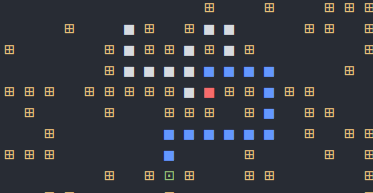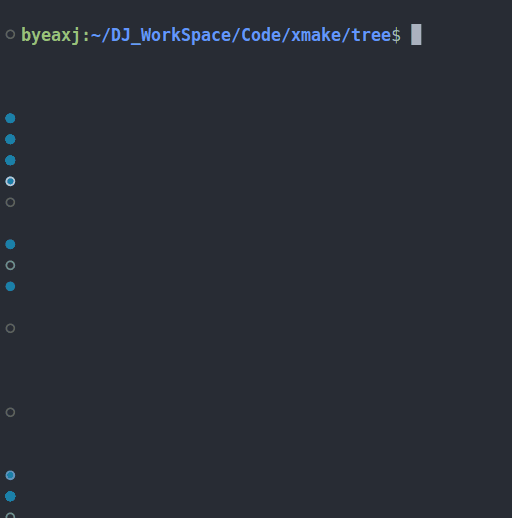请注意,本文编写于 727 天前,最后修改于 368 天前,其中某些信息可能已经过时。
目录

A算法总结(Summary of the A Method)
-
把起点加入 open list 。
-
重复如下过程: a. 遍历 open list ,查找 F 值最小的节点,把它作为当前要处理的节点。 b. 把这个节点移到 close list 。 c. 对当前方格的 4 个相邻方格的每一个方格判断处理
1. 如果它是不可抵达的或者它在 close list 中,忽略它。否则,做如下操作。 2. 如果它不在 open list 中,把它加入 open list ,并且把当前方格设置为它的父亲,记录该方格的 F , G 和 H 值。 3.如果它已经在 open list 中,检查这条路径 ( 即经由当前方格到达它那里 ) 是否更好,用 G 值作参考。更小的 G 值表示这是更好的路径。如果是这样,把它的父亲设置为当前方格,并重新计算它的 G 和 F 值。如果你的 open list 是按 F 值排序的话,改变后你可能需要重新排序。 -
停止
- 把终点加入到了 open list 中,此时路径已经找到了
- 查找终点失败,并且 open list 是空的,此时没有路径
-
保存路径。从终点开始,每个方格沿着父节点移动直至起点,这就是你的路径。
效果图

代码
❗ 代码目前仍有bug, 目前已知bug: 1. 最终显示的路线不是最短路线。 2. 出发后在第一格有概率直接退出 ❗ 在Linux上运行 运行:
bashg++ main.cpp -o app ./app
C++#include <iostream>
#include <vector>
#include <time.h>
#include <stdlib.h>
#include <unistd.h>
int steps = 0;
namespace MapFunction
{
using MapItem = std::string;
using MapContainer = std::vector<std::vector<MapItem>>;
const int MapSize = 20;
int BlockCount = 110;
const MapItem BlockItem = "\033[93m⊞\033[0m";
const MapItem TargetItem = "\033[92m⊡\033[0m";
const MapItem RoleItem = "\033[91m■\033[0m";
const MapItem SpaceItem = " ";
const MapItem PathItem = "\033[94m■\033[0m";
const MapItem ProgressItem = "\033[97m■\033[0m";
struct Point
{
int x;
int y;
};
Point StartPoint;
Point EndPoint;
MapContainer MissionMap(MapSize);
Point _m_RandomGen()
{
srand(time(NULL));
int x = rand() % MapSize;
int y = rand() % MapSize;
while (MissionMap[y][x] != SpaceItem)
{
x = rand() % MapSize;
y = rand() % MapSize;
}
Point temp;
temp.x = x;
temp.y = y;
return temp;
}
void _m_MapItemSet(const Point &pos, const MapItem &item)
{
MissionMap[pos.y][pos.x] = item;
}
void _m_SetItemPos()
{
EndPoint = _m_RandomGen();
_m_MapItemSet(EndPoint, TargetItem);
StartPoint = _m_RandomGen();
_m_MapItemSet(StartPoint, RoleItem);
Point temp;
if (BlockCount > (MapSize - 1) * (MapSize - 1))
BlockCount = MapSize / 2;
for (size_t i = 0; i < BlockCount; i++)
{
temp = _m_RandomGen();
_m_MapItemSet(temp, BlockItem);
}
}
void MapInit()
{
for (int i = 0; i < MapSize; i++)
{
MissionMap[i].resize(MapSize);
}
for (int i = 0; i < MapSize; i++)
{
for (int j = 0; j < MapSize; j++)
{
MissionMap[i][j] = SpaceItem;
}
}
_m_SetItemPos();
}
void _m_FlushDelay()
{
usleep(100000);
}
void MapFlush(bool flag)
{
if(flag){
std::cout << "\033c";
MissionMap[EndPoint.y][EndPoint.x] = TargetItem;
MissionMap[StartPoint.y][StartPoint.x] = RoleItem;
for (int i = 0; i < MapSize; i++)
{
for (int j = 0; j < MapSize; j++)
{
std::cout << MissionMap[i][j] << " ";
}
std::cout << "│\n";
}
for (int i = 0; i < MapSize; i++)
std::cout << "──";
std::cout << "┘\n";
std::cout << steps++ << std::endl;
_m_FlushDelay();
}
}
} // namespace MapFunction
namespace AStarFunction
{
using namespace MapFunction;
constexpr int PathCost = 10;
class MyPoint
{
public:
int F, G, H;
int x, y;
bool isWalked;
public:
bool operator==(const MyPoint &pos)
{
return (pos.x == x && pos.y == y);
}
void SetH(const MyPoint &cur, const MyPoint &end)
{
H = PathCost * (abs(cur.x - end.x) + abs(cur.y - end.y));
}
void SetG(int num) { G = num; }
void SetF() { F = G + H; }
};
class TreeNode
{
public:
// curren Point
MyPoint pos;
// container to store one or one more child point
std::vector<TreeNode *> pChildNode;
// parent Node;
TreeNode *pParent;
int TreeLength;
public:
TreeNode(const MyPoint &next)
{
pos = next;
pParent = nullptr;
}
};
enum Dir
{
cur_up,
cur_down,
cur_left,
cur_right
};
// check border and block
bool walkCheck(const MapContainer &box, const MyPoint &pos)
{
if (pos.y < 0 || pos.x < 0 || pos.y >= MapSize || pos.x >= MapSize)
{
return false;
}
if (box[pos.y][pos.x] == TargetItem)
{
return true;
}
// if (box[pos.y][pos.x] == BlockItem || box[pos.y][pos.x] == RoleItem)
if (box[pos.y][pos.x] != SpaceItem)
{
return false;
}
return true;
}
void StartAStar()
{
MapFunction::MapInit();
MyPoint StartPos;
StartPos.x = StartPoint.x;
StartPos.y = StartPoint.y;
MyPoint EndPos;
EndPos.x = EndPoint.x;
EndPos.y = EndPoint.y;
// root init
TreeNode *pRoot = new TreeNode(StartPos);
pRoot->pParent == nullptr;
pRoot->TreeLength = 0;
TreeNode *pCur = pRoot;
TreeNode *pTemp = nullptr;
std::vector<TreeNode *> buff;
std::vector<TreeNode *> FinishList;
std::vector<TreeNode *> OpenList;
bool FindFlag = false;
while (1)
{
if (pCur != nullptr)
{
// check all directions and sava the direction that can move to;
for (size_t i = 0; i < 4; i++)
{
pTemp = new TreeNode(pCur->pos);
switch (i)
{
case cur_up:
pTemp->pos.y--;
break;
case cur_down:
pTemp->pos.y++;
break;
case cur_left:
pTemp->pos.x--;
break;
case cur_right:
pTemp->pos.x++;
break;
default:
break;
}
if (walkCheck(MissionMap, pTemp->pos))
{
if (pTemp->pos == EndPos)
{
buff.clear();
}
pCur->pChildNode.push_back(pTemp);
pTemp->pParent = pCur;
pTemp->TreeLength = pCur->TreeLength + 1;
pTemp->pos.SetG(PathCost);
pTemp->pos.SetH(pTemp->pos, EndPos);
pTemp->pos.SetF();
buff.push_back(pTemp);
if (pTemp->pos == EndPos)
{
break;
}
// MissionMap[pTemp->pos.y][pTemp->pos.x] = ProgressItem;
}
else
{
delete pTemp;
pTemp = nullptr;
}
}
}
// push qualified data into openlist and clean buffer list.
for (auto it = buff.begin(); it != buff.end(); ++it)
{
OpenList.push_back(*it);
}
buff.clear();
if (OpenList.size() > 0)
{
/* code */
// find all minimum score
auto minF = OpenList.begin();
for (auto it = OpenList.begin(); it != OpenList.end(); ++it)
{
minF = (*minF)->pos.F < (*it)->pos.F ? minF : it;
}
pCur = *minF;
OpenList.erase(minF);
MissionMap[pCur->pos.y][pCur->pos.x] = ProgressItem;
if (pCur->pos == EndPos)
{
FindFlag = true;
FinishList.push_back(pCur);
pCur = nullptr;
break;
}
MapFunction::MapFlush(true);
if (OpenList.size() == 0)
{
break;
}
}
}
if (FindFlag)
{
auto MinSize = FinishList.begin();
for (auto it = FinishList.begin(); it != FinishList.end(); ++it)
{
MinSize = (*MinSize)->TreeLength < (*it)->TreeLength ? MinSize : it;
}
auto pTemp2 = *MinSize;
while (pTemp2->pParent != nullptr)
{
MissionMap[pTemp2->pos.y][pTemp2->pos.x] = PathItem;
pTemp2 = pTemp2->pParent;
}
MapFunction::MapFlush(true);
}
}
} // namespace A
int main(int argc, char **argv)
{
AStarFunction::StartAStar();
return 0;
}
本文作者:beiklive
本文链接:
版权声明:本博客所有文章除特别声明外,均采用 BY-NC-SA 许可协议。转载请注明出处!
目录